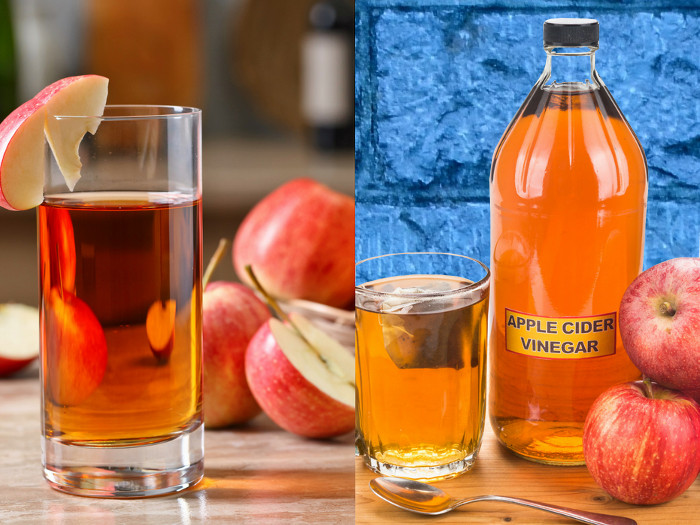Many people don’t understand the difference between apple cider vs apple juice, but there are some clear points where these two apple-based drinks diverge.
Apple Cider vs Apple Juice
Apple cider and apple juice are both made from the same fruit, but that is where most of the similarities end.
Process
- Apple cider: It is produced from apples but is a largely unprocessed and untreated beverage. Apple cider is made by washing, cutting and then mashing apples until it forms something akin to applesauce. From that point, the mashed apples are placed in racks and pressed, allowing the juice from the apple to separate from most of the apple pulp. [1]
- Apple juice: On the other hand, apple juice is derived by pressing apples and all of the liquid is separated from the apple material during a filtration process.

These beverages might come from the same source, but the end result is quite different. Photo Credit: Shutterstock
Nutritional Facts
Both, apple cider and apple juice, have a similar level of calories, roughly 120-130 calories per 8 ounces. If you consider the nutritional profile for apple cider vs apple juice, there is a little difference.
- Apple cider: It is a pure, organic form of apple juice and contains high amounts of vitamin C and pectin which are both beneficial to health. Apple cider does not have any added sugars but has a high amount of natural sugar.
- Apple juice: Vitamin C must often be added back into apple juice since some of it is lost in the pasteurization process. Apple juice also rich in natural sugar. Depending on the brand, there are also added sugars in the juice which reduces the health benefits of this fruit drink. [2]
Taste
- Apple cider: This beverage strikes the perfect balance between tart and sweetness, which is achieved by blending different apple varieties. It is also slightly fizzy because cider can undergo fermentation due to its unfiltered form.
- Apple juice: Homemade apple juice tastes of the fruit itself. However, the taste of packaged apple juice depends on the flavor of the concentrate. Many commercial brands have a high amount of added sugar, which makes it cloyingly sweet.
Note: Apple juice is not a very good substitute for apple cider, due to its high level of sweetness. A better substitute for apple cider is something acidic such as apple cider vinegar or lemon juice. Homemade unsweetened apple juice could be the next option.
Shelf Life
- Apple cider: In much of the world, the word cider refers to an alcoholic beverage, but apple cider is typically an unsweetened and non-alcoholic form of unfiltered apple juice. It is now often treated to remove possible bacteria, but remains largely untreated, and must be refrigerated. Apple cider can go bad within 2-3 weeks. This is why it is important for people with a weak immune system to first boil unpasteurized apple cider to kill any harmful bacteria. [3]
- Apple juice: Apple juice is a juice that has been filtered and pasteurized. It does not contain solids or sediments. So it stays fresh longer. [4]
Availability
- Apple cider: Fermented apple juice, in its raw form, is bottled and sold as cider, commonly during autumn.
- Apple juice: It is available year-round since it can be vacuum sealed and stored outside of the refrigerator.
